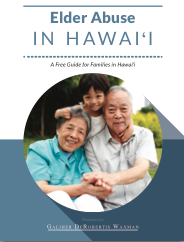HAWAI‘I’S AGING POPULATION has more options than ever before when it comes to their care. There are several different types of senior care homes in Hawaiʻi, each offering their own unique level of care and capacity. It is critical to know what level of care and what type of services to expect before placing a loved one in any of these facilities.
Assisted living facilities (“ALF”) typically offer a level of care and attention that is somewhere between independent living and skilled nursing. These facilities are often private pay, although some may accept Medicaid. Many times consumers are misled to think that their loved one will receive 24-hour skilled nursing in these facilities, when in reality these facilities’ marketing materials rarely add up to the true services being rendered. Assisted living facilities are not appropriate for one who requires skilled nursing, and are “designed to respond to individual needs, to promote choice, responsibility, independence, privacy, dignity, and individuality.”
“Our society somehow must rise to the challenge of ensuring that all of our elders are treated with care and dignity, for the test of a civilization is in the way that it treats its most helpless members.” —Ilana K. Waxman, Managing Partner at Galiher DeRobertis & Waxman
The most popular types of senior care homes in Hawaiʻi are:
- Assisted Living Facilities
- Adult Residential Care Homes
- Expanded Adult Residential Care Homes
- Community Care Foster Homes
- Skilled Nursing Facilities
- Current Regulations Provide Inadequate Protection
Assisted living facilities are very loosely regulated in Hawaiʻi per Hawaiʻi Administrative Rules Title 11 Chapter 90. There are currently 13 assisted living facilities licensed in Hawaiʻi, housing approximately 2,250 residents. The Plaza is the only assisted living facility with more than one location in Hawaiʻi. Several more are either under construction or in the planning phase, so there could very well be 20 assisted living facilities by the end of the decade.
Adult Residential Care Homes (“ARCH”) are very similar to assisted living facilities in terms of standard of care. These homes are for elders “who require at least minimal assistance in the activities of daily living, personal care services, protection, and health care services, but who do not need the professional health services provided in an intermediate, skilled nursing, or acute care facility.”
Senior Care a Gigantic Industry in Hawaiʻi
There are currently approximately 500 licensed ARCH’s in Hawaiʻi (included Expanded ARCH’s) housing approximately 3,500 residents. Type I ARCH’s can house up to five residents. Type II ARCH’s allow six or more residents, but have more stringent requires regarding type of resident. The main difference between an ARCH and an ALF is that an ARCH is typically much smaller and more of a residential (as opposed to commercial) experience. The qualifications needed to obtain an ARCH license in Hawaiʻi are stunningly minimal – one needs to simply be a certified nurse aide over the age of 21 and take a few courses at Kapiolani Community College: http://health.hawaii.gov/ohca/files/2013/06/Min-Qualif-for-ARCH.pdf
Expanded Adult Residential Care Homes have a higher standard of care than traditional ARCH’s in that they are appropriate for adults who require a nursing home level of care. The term “expanded” refers to the standard of care and types of residents the facility can take on. These, too, are broken down into Type I and Type II.
Knowing the Options Could Help Make Better Decisions About Senior Care
Community Care Foster Homes are extremely similar to Expanded ARCH’s and also offer nursing home level of care. The main difference is that under § 321-481 these facilities cannot house more than two adults at any time, and at least one of them must be a Medicaid recipient. There are currently approximately 400 community care foster homes in Hawaiʻi housing approximately 1,000 residents.
Skilled nursing facilities (“SNF”) offer the highest level of care a senior can receive in Hawaiʻi. Per Title 11 Chapter 94, SNF’s are for “patients whose primary need is for twenty-four hours of skilled nursing care on an extended basis and regular rehabilitation services.” There are approximately 49 SNF’s licensed in Hawaiʻi caring for approximately 4,300 residents.




